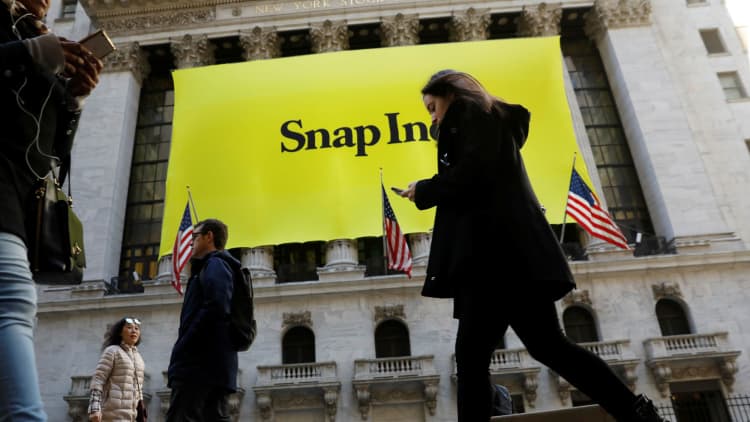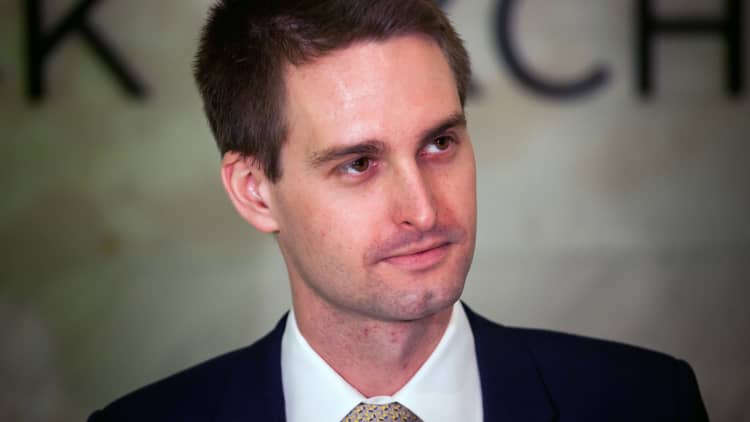
Snap reported quarterly financial results for its first time as a public company on Wednesday, posting revenue that missed estimates and slower-than-expected user growth.
Shares plummeted more than 20 percent on Thursday. The company spent $2 billion on stock-based compensation expenses after its initial public offering, widening net losses for the quarter to $2.2 billion.
CEO Evan Spiegel got a $750 million bonus for taking Snap public. He told analysts on a conference call that the company was focused on improving quality for users during the first quarter, especially for those with Android mobile phones.
Despite the steep loss during the quarter, Snap is "still in investment mode," the company's chief financial officer, Drew Vollero, said on a conference call with analysts.
The numbers
- Revenue: $150 million reported vs. $158 million expected by a Thomson Reuters consensus estimate.
- Global DAUs: 166 million reported vs. 167.3 million expected by StreetAccount.
- ARPU: 90 cents reported vs. 90 cents per share expected by StreetAccount.
- Loss of $2.31 a share including compensation expenses.
- Analysts at Thomson Reuters estimate an adjusted loss of 20 cents per share, wider than the 19 cents expected.
That's compared with revenue of $38.8 million in the year-ago period.
Amid trouble at Facebook and Google, unprofitable underdog Snapchat aims for engagement
As the company behind the viral ephemeral messaging app and Spectacles glasses, Snap's IPO was the biggest technology offering since Alibaba.
And it's growing at an extraordinary rate: Revenue rose 286 percent year over year in the first quarter. Daily active users rose 36 percent from the year-ago period, and average revenue per user grew 181 percent.
More than 3 billion Snaps were made daily in the first quarter, the company said, up from 2.5 billion in the third quarter of 2016. Users spent an average of 30 minutes a day on Snapchat, the company's chief strategist, Imran Khan, said on the conference
"We made good progress this quarter improving the performance and quality of our Snapchat application, especially on Android, which has helped result in increased net user adds and engagement," Khan told CNBC. "We still have a lot of work to do, and are excited about the potential
But since its IPO in early March, Snap has faced an uphill battle to convince Wall Street it can make money with advertising, even with Facebook and Google dominating the market.
Spiegel said that automation will help the company make more money for advertisers.
"People are going to copy your product if you build great stuff," he said. "Just because Yahoo has a search box doesn't make it Google."
Facebook, in particular, has pushed aggressively into Snap's turf. Boss Mark Zuckerberg told analysts that Instagram Stories has 200 million daily active users, and WhatsApp Status has more than 175 million daily active users.
As a whole, Facebook has 1.28 billion daily active users, nearly eight times as many as Snapchat.
Other revenue sources, like Spectacles, have hardly made a dent in the company's business. Analysts surveyed by Thomson Reuters expect Snap to post a per-share loss through the end of 2018.
Snap has not made great gains in the markets, trading mostly below the high of $29.44 in its first week of trading. Indeed, the stock fell as low as $17.07 after hours, just 7 cents above its IPO price, as shares changed hands in heavy volume.
When Facebook, Yelp, Twitter and LinkedIn reported their first quarterly results as public companies, the stocks fell by an average 14.1 percent the next day, according to Jim Strugger,
Snap should have set its expectations lower, Art Hogan, chief market strategist at Wunderlich Securities, told CNBC's "Closing Bell" on Wednesday. He explained that a company's first earnings report as a public company is "really dependent" on executives giving realistic guidance. But that's just part of the growing pains of becoming a public company, Hogan said.
— CNBC's Evelyn Cheng contributed to this report
Disclosure: NBCUniversal, the parent company of CNBC, is an investor in Snap.
Watch: Snap CEO on earnings call



